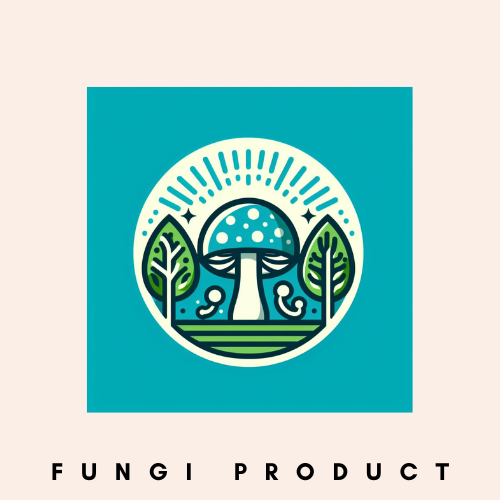Several companies are pioneering sustainable solutions using mycelium and fungi across multiple industries:
1. Sustainable Materials & Packaging
- Ecovative Design develops MycoComposite for biodegradable packaging, insulation, and furniture. They also produce MycoFlex, a flexible mycelium-based alternative to foams used in cosmetics, luggage, and footwear.
- MycoWorks has launched the world’s first commercial-scale Fine Mycelium™ production facility for mycelium-based leather alternatives. They also produce MycoInsulation for sustainable building insulation.
- Mogu specializes in mycelium-based flooring, acoustic, and wall panels, using agricultural waste to create biodegradable, plastic-free materials.
2. Food & Alternative Proteins
- Infinite Roots (formerly Mushlabs) raised $58M to develop mycelium-based protein, showcasing its potential as a sustainable food source.
- Prime Roots produces kōji-based meat alternatives that mimic the texture and taste of seafood, beef, poultry, and pork .
- Atlast Food Co. (a spin-off from Ecovative) focuses on whole-cut mycelium-based meat substitutes, providing a more realistic alternative to traditional meats .
- Terramino Foods creates MycoProtein, a plant-based protein source derived from mycelium, contributing to the alternative protein market.
- EniferBio in Finland develops fungi-based aquaculture feed, offering a sustainable protein alternative to soy and fish meal.
3. Waste Management & Environmental Remediation
- Mycocycle transforms plastic and petrochemical waste into reusable materials using fungi, creating fire- and water-resistant byproducts for construction and manufacturing .
- Mycoremediation Projects: Research initiatives are exploring fungi’s ability to degrade plastic, clean up oil spills, and filter pollutants from wildfire-damaged water systems.
4. Construction & Bio-Architecture
- Ecovative’s DARPA Project is researching self-healing mycelium-based structures that could be deployed in disaster relief efforts or remote areas.
These innovations highlight mycelium’s potential to replace plastics, reduce food waste, clean up pollution, and create sustainable alternatives to traditional materials. The sectors seeing the most breakthroughs are packaging, textiles, alternative proteins, waste management, and construction.
THE SECTORS AND THEIR KEY COMPANIES FURTHER EXPLAINED
Here’s a sector-by-sector breakdown of the most important businesses leveraging mycelium and fungi for sustainable solutions:
1. Sustainable Materials & Packaging
Key Companies:
- Ecovative Design (USA)
-
- Products: MycoComposite™ (biodegradable packaging, insulation, furniture), MycoFlex™ (flexible foams for cosmetics, luggage, footwear)
- Impact: Replaces plastic packaging, synthetic foams, and leather with compostable alternatives.
- Notable Projects: Partnered with Sephora and fashion brands to develop mycelium-based beauty products and textiles.
- MycoWorks (USA)
-
- Products: Fine Mycelium™ (high-quality, durable leather alternatives), MycoInsulation (for sustainable building insulation)
- Impact: Reduces reliance on animal-based leather and synthetic materials.
- Notable Projects: Opened the first commercial-scale Fine Mycelium™ plant in South Carolina in 2023.
- Mogu (Italy)
-
- Products: Circular flooring materials, acoustic panels, and wall panels made from mycelium and agricultural waste.
- Impact: Provides 100% plastic-free, biodegradable building materials.
- Notable Projects: Won Germany’s Eco Design Award for its Foresta acoustic panel system .
Sector Impact:
- Replacing petroleum-based packaging (Ecovative)
- Reducing environmental footprint in textiles & fashion (MycoWorks)
- Creating sustainable construction materials (Mogu)
2. Alternative Proteins & Food
Key Companies:
- Infinite Roots (Germany, formerly Mushlabs)
-
- Product: Mycelium-based protein for plant-based meat
- Impact: Provides a high-protein, nutrient-rich alternative to soy and pea protein, with a smaller environmental footprint.
- Investment: Raised $58M in Series B funding (largest mycelium investment in Europe).
- Atlast Food Co. (USA, spin-off of Ecovative)
-
- Product: Whole-cut mycelium-based meats
- Impact: Replicates the texture of real meat without requiring additives or binders.
- Notable Projects: Partnership with MyForest Foods to produce bacon from mycelium.
- Prime Roots (USA)
-
- Product: Kōji-based meat alternatives for seafood, beef, poultry, and pork.
- Impact: Uses solid-state fermentation to create a fibrous texture mimicking real meat.
- Terramino Foods (USA)
-
- Product: MycoProtein
- Impact: Offers a highly sustainable alternative to traditional proteins.
- EniferBio (Finland)
-
- Product: Fungi-based aquaculture feed
- Impact: Provides a sustainable protein alternative to fish meal, reducing pressure on ocean ecosystems.
Sector Impact:
- Creating meat alternatives that closely mimic real meat (Atlast, Prime Roots)
- Offering sustainable protein sources for livestock & aquaculture (EniferBio)
- Providing a healthier, more eco-friendly protein alternative (Infinite Roots, Terramino)
3. Waste Management & Environmental Remediation
Key Companies:
- Mycocycle (USA)
-
- Process: Uses fungi to break down plastic and petrochemical waste
- Impact: Diverts construction & industrial waste from landfills and converts it into reusable materials.
- Notable Projects: Partnership with flooring giant Tarkett to treat commercial flooring waste.
- Post-Fire Biofiltration Initiative (California, USA)
-
- Process: Uses fungi-packed wattles to filter pollutants from wildfire-damaged waterways.
- Impact: Breaks down toxic chemicals into harmless organic matter .
- Mycoremediation Research (Wisconsin, USA)
-
- Process: Uses oyster mushrooms to clean up oil spills and polluted soils.
- Impact: Provides an alternative to chemical-intensive remediation.
Sector Impact:
- Breaking down plastic & petrochemical waste (Mycocycle)
- Using fungi to filter and clean polluted water (California Biofiltration)
- Developing solutions for soil decontamination & oil spill cleanup (Wisconsin research)
4. Construction & Bio-Architecture
Key Companies:
- Ecovative (USA) – DARPA Project
-
- Research: Self-healing, living mycelium-based structures
- Impact: Potential applications for disaster relief and extraterrestrial habitats.
- Notable Projects: Developing biodegradable shelters that can repair themselves and even produce medicine.
- Mogu (Italy)
-
- Product: Mycelium-based flooring and wall panels
- Impact: Reduces VOC ( Volatile Organic Compounds ) emissions and environmental impact in construction.
Sector Impact:
- Potential for self-repairing mycelium structures (Ecovative/DARPA)
- Eco-friendly building materials for interiors (Mogu)
Key Takeaways
- Sustainable Materials & Packaging – Mycelium replaces plastic, synthetic foams, and animal-based leather.
- Alternative Proteins & Food – Mycelium provides realistic meat substitutes and sustainable protein sources.
- Waste Management & Environmental Remediation – Fungi are used to decompose pollutants, plastics, and oil spills.
- Construction & Bio-Architecture – Mycelium-based insulation, panels, and self-repairing structures are emerging.

A BIT MORE ABOUT DIFFERENT INTERESTING PLAYERS
Here’s an overview of the most important businesses bringing sustainable solutions based on mycelium and fungi, categorized by sector:
1. Packaging
Dominant Companies:
- Ecovative LLC: Pioneered the use of mycelium for sustainable packaging, producing biodegradable alternatives to plastic. Their Mushroom® Packaging is used in industries like food and cosmetics.
- Magical Mushroom Company: Develops mycelium-based packaging solutions for consumer goods, offering biodegradable, compostable materials.
Market Trends:
Packaging is currently the dominant sector for mycelium applications due to increasing demand for eco-friendly alternatives to plastic, with industries such as food, electronics, and cosmetics adopting these solutions
2. Construction & Insulation
Dominant Companies:
- Ecovative LLC: Also active in construction materials, offering mycelium-based insulation and biodegradable building components.
- Grown.Bio: A Dutch company specializing in mycelium-based insulation panels and bricks.
Market Trends:
Mycelium insulation and construction materials are gaining traction due to their natural fire resistance, lightweight structure, and excellent thermal insulation properties
introspectivemarketresearch.com.
3. Textiles & Fashion
Dominant Companies:
- Bolt Threads: Developed Mylo™, a leather-like material made from mycelium, used by fashion brands like Adidas and Stella McCartney.
- MycoWorks: Their Reishi™ material is another high-end mycelium-based leather alternative, favored by luxury brands.
Market Trends:
The mycelium textile sector is rapidly growing as sustainable alternatives to animal and synthetic leather gain popularity, especially in high-end fashion
4. Food & Beverage
Dominant Companies:
- Atlast: Developed MyBacon, a plant-based bacon alternative made from mycelium.
- Mushlabs GmbH: A German company working on mycelium-based protein for meat substitutes.
- Four Sigmatic & FreshCap Mushrooms: Focus on mycelium-based nutritional supplements and functional mushroom products.
Market Trends:
Mycelium-based food products are becoming more mainstream due to their nutritional benefits, sustainability, and potential to replace traditional meat sources
introspectivemarketresearch.com.
5. Pharmaceuticals & Health
Dominant Companies:
- MycoTechnology: Produces FermentIQ™, a mycelium-based protein used to improve the taste and nutrition of plant-based foods.
- Chinova Bioworks: Uses mushroom-derived ingredients as natural preservatives in food and beverages.
Market Trends:
Mycelium is being explored for its potential in cancer treatment, gut health, and immune system support, with continued research driving new applications
introspectivemarketresearch.com.
6. Automotive & Industrial Applications
Dominant Companies:
- Huisong: Develops mycelium-based materials for various industries, including automotive and construction.
- Magical Mushroom Company: Investigating the use of mycelium composites in car interiors.
Market Trends:
Automakers are starting to test mycelium-based materials as biodegradable alternatives for car interiors and lightweight components
Conclusion
The mycelium industry is expanding across multiple sectors, with packaging, construction, textiles, food, and healthcare being the most promising. Companies like Ecovative, MycoWorks, Bolt Threads, and Atlast are leading innovation in their respective industries. The North American and European markets are driving growth due to increasing regulations and consumer demand for sustainable solutions
introspectivemarketresearch.comgminsights.com.
I would like to bring you a more detailed focus on any particular sector while building out this website. The idea is to contact and visit the different players bringing their exciting solutions.
I will create ‘pages’ on this website bringing each company’s profile and continuing publishing ‘posts’ concerning their amazing products and general information on what is going on in the world of mycelium and fungi based products that comes out of all the groundbreaking research.
So feel invited to travel with me and vivit us regularly on out website www.fungiproduct.com
Notes
What Is Protein?
Protein is a macronutrient made up of amino acids, which are the building blocks of the body. It is essential for growth, repair, and overall function. Proteins are found in many foods, including meat, fish, dairy, eggs, beans, nuts, and soy.
What Does Protein Do in Your Body?
- Builds and Repairs Tissues – Essential for muscle growth and healing wounds.
- Supports Enzymes and Hormones – Many enzymes and hormones (like insulin) are made of protein.
- Boosts Immune Function – Helps create antibodies to fight infections.
- Provides Structural Support – Found in skin, hair, nails, and connective tissues.
- Transports Nutrients – Carries oxygen (hemoglobin) and nutrients throughout the body.
- Maintains Fluid Balance – Prevents swelling by regulating body fluids.
- Serves as an Energy Source – If needed, protein can be used for energy, though it’s not the body’s primary fuel source.
Getting enough protein is crucial for overall health, especially for muscle maintenance, immunity, and metabolism.
———-
What is Solid-State Fermentation (SSF)?
Solid-state fermentation (SSF) is a microbial fermentation process that takes place on solid materials without free-flowing water. Microorganisms, such as fungi or bacteria, grow on a solid substrate, using it as both a nutrient source and a physical support.
Key Features of SSF:
- Low moisture content (unlike liquid fermentation, which occurs in a submerged liquid medium).
- Commonly uses agricultural waste (e.g., wheat bran, rice husks, corn stalks) as substrates.
- Fungi, especially filamentous fungi (like Aspergillus and Rhizopus), thrive better than bacteria due to the dry conditions.
- Eco-friendly and cost-effective, often used for sustainable bioprocessing.
Applications of SSF:
- Enzyme Production – Used to produce enzymes like amylase, cellulase, and protease for industries.
- Food and Beverage Industry – Fermentation of tempeh, miso, and certain cheeses.
- Biodegradation and Waste Management – Converts agricultural and food waste into valuable bioproducts.
- Pharmaceuticals – Production of antibiotics and bioactive compounds.
- Mycelium-Based Products – SSF is widely used in mycelium-based materials for food (e.g., mycoprotein), packaging, and even leather substitutes.
Since you’re interested in mycelium-based products, SSF plays a crucial role in growing fungi for construction materials, insulation, and alternative textiles.
———-
Volatile Organic Compounds
VOC stands for Volatile Organic Compounds. They are organic chemicals that have a high vapour pressure at room temperature. High vapor pressure correlates with a low boiling point, which relates to the number of the sample’s molecules in the surrounding air, a trait known as volatility. VOCs are emitted as gases from certain solids or liquids and include a variety of chemicals, some of which may have short- and long-term adverse health effects. Concentrations of many VOCs are consistently higher indoors than outdoors.
wikipedia.org

André Raymond
